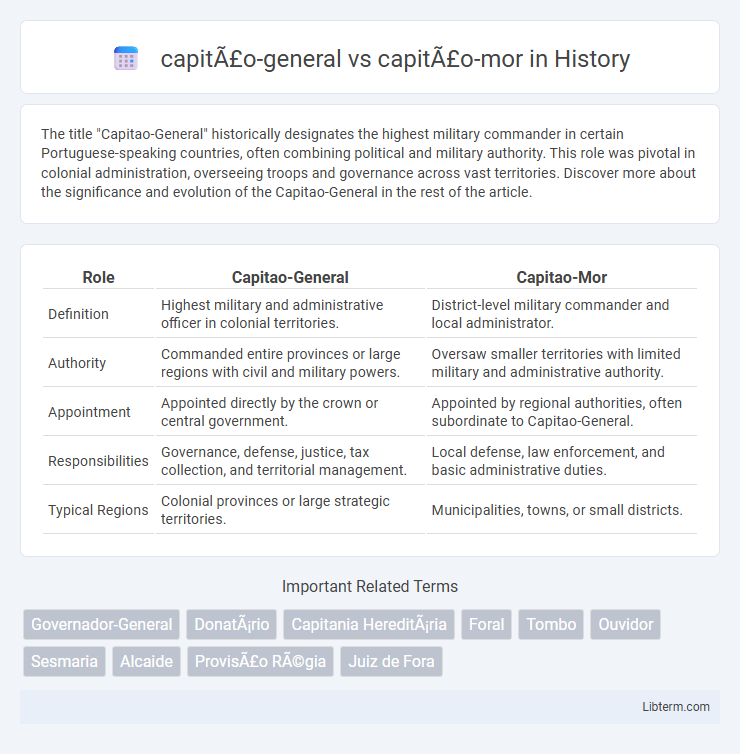The title "Capitao-General" historically designates the highest military commander in certain Portuguese-speaking countries, often combining political and military authority. This role was pivotal in colonial administration, overseeing troops and governance across vast territories. Discover more about the significance and evolution of the Capitao-General in the rest of the article.
Table of Comparison
| Role | Capitao-General | Capitao-Mor |
|---|---|---|
| Definition | Highest military and administrative officer in colonial territories. | District-level military commander and local administrator. |
| Authority | Commanded entire provinces or large regions with civil and military powers. | Oversaw smaller territories with limited military and administrative authority. |
| Appointment | Appointed directly by the crown or central government. | Appointed by regional authorities, often subordinate to Capitao-General. |
| Responsibilities | Governance, defense, justice, tax collection, and territorial management. | Local defense, law enforcement, and basic administrative duties. |
| Typical Regions | Colonial provinces or large strategic territories. | Municipalities, towns, or small districts. |
Introdução aos Títulos Militares Coloniais
Capitao-general and capitao-mor were distinct colonial military titles in Portuguese territories, each with specific administrative and military responsibilities. The capitao-general served as the highest military and civil authority in a captaincy, overseeing defense, governance, and enforcement of royal directives. The capitao-mor, typically subordinate to the capitao-general, commanded local troops and maintained order within smaller jurisdictions or individual fortresses.
Origem e Evolução do Capitão-General
The Capitao-General originated in the Portuguese and Spanish colonial administration as a high-ranking military and administrative official responsible for governing large territories, with powers extending beyond those of a Capitao-Mor, who typically commanded smaller regions or specific military units. Over time, the Capitao-General evolved to encompass broader civil authority, integrating military command with political governance, especially in strategic colonies like Brazil and the Philippines during the 16th to 18th centuries. This evolution reflected the need for centralized control in vast colonial possessions, distinguishing the Capitao-General as a superior rank with comprehensive jurisdiction compared to the more localized and limited role of the Capitao-Mor.
Capitão-Mor: Função e Importância Histórica
The Capitao-Mor held a crucial military and administrative role in Portuguese colonial territories, responsible for defense, justice, and maintaining order within the captaincy. This position often wielded significant local power, coordinating militia forces and overseeing fortifications to protect settlements from external threats and indigenous resistance. Historically, the Capitao-Mor's authority was essential for the stability and expansion of Portuguese colonial domains, serving as the primary representative of royal interests on the ground.
Diferenças Hierárquicas entre Capitão-General e Capitão-Mor
The Capitao-General held a superior hierarchical position compared to the Capitao-Mor, often commanding entire provinces or large military districts, while the Capitao-Mor typically oversaw individual forts or smaller territorial units. The Capitao-General possessed broader administrative and military authority, including the power to appoint subordinate officers such as Capitaes-Mores. In Portuguese colonial and military structures, this clear distinction in rank underscored differing scopes of command and responsibility between the two titles.
Responsabilidades e Poderes de um Capitão-General
The Capitao-General held supreme military authority over a specific territory, commanding both land and naval forces, and was responsible for implementing royal directives, maintaining public order, and overseeing colonial administration. Unlike the Capitao-Mor, whose powers were generally limited to military leadership and defense within smaller districts or fortresses, the Capitao-General exercised broad civil and judicial powers, often acting as the governor with authority to legislate and enforce laws. The role encompassed strategic planning, resource allocation, and coordination with the crown, ensuring political control and security of colonies or provinces.
Atribuições Principais do Capitão-Mor
The Capitao-Mor primarily held military and administrative authority over a designated territory or fortification, responsible for defense organization and local governance. This role included overseeing the militia, managing resources for territorial security, and enforcing colonial policies within the Captaincy. In contrast, the Capitao-General typically possessed broader strategic command, often governing multiple captaincies or serving as the highest colonial authority with overarching civil and military jurisdiction.
Nomeação e Processo de Escolha dos Capitães
The capitao-general was typically appointed directly by the Portuguese Crown or royal authority, reflecting a centralized nomination process involving high-level political decision-making and formal royal decrees. In contrast, the capitao-mor was often chosen through local mechanisms within municipalities or colonial administrations, sometimes involving local elites or military councils, emphasizing regional influence in the selection process. This distinction underlines the capitao-general's role as a royal representative with broader territorial power, while the capitao-mor had a more localized mandate, often linked to defense and administrative responsibilities in smaller jurisdictions.
Capitão-General e Capitão-Mor em Diferentes Colônias
Capitao-General and Capitao-Mor were key military and administrative ranks in Portuguese colonies, with Capitao-General typically overseeing larger territories with broader civil and military authority, such as Brazil and Angola. In contrast, Capitao-Mor held more localized command over smaller settlements or specific fortresses, like those in Mozambique or Goa. The distinction between these roles reflected the varying sizes and strategic importance of the colonies, adapting colonial governance to regional needs.
Influência dos Títulos na Estrutura Administrativa Colonial
Capitao-general held superior authority over capitao-mor within the colonial administrative hierarchy, often governing large territories with both military and civil powers that influenced regional control. Capitao-mor typically managed smaller districts or towns, focusing on local defense and administration under the capitao-general's broader jurisdiction. This hierarchical distinction shaped colonial governance by centralizing strategic decisions and military command at the capitao-general level, thereby reinforcing the colonial state's territorial influence and administrative efficiency.
Legado dos Capitães na História Militar e Colonial
Capitao-general held a superior military and administrative role compared to capitao-mor, overseeing broader territorial jurisdictions during the Portuguese colonial era. The legacy of Capitaes-generais prominently shaped colonial governance and military strategies in Asia, Africa, and the Americas. Capitaes-mores often managed localized defense and naval operations, contributing significantly to the operational effectiveness and territorial consolidation of Portuguese overseas domains.
capitão-general Infographic

 libterm.com
libterm.com